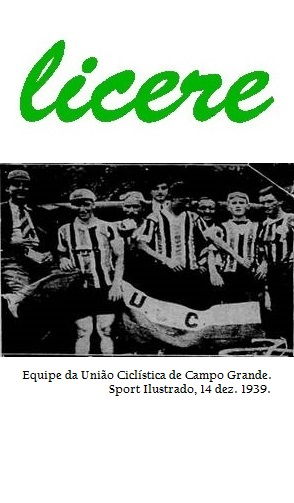Leisure and Games
Reflections Based on the World of Warcraft
DOI:
https://doi.org/10.35699/1981-3171.2015.1077Keywords:
Leisure Activities, Play and PlaythingsAbstract
Using data collected with the aid of ethnographic research, the aim of this essay is to present some thoughts on digital games as cultural practices of leisure. The study field used to develop the research was the virtual world created by the game World of Warcraft - a virtual space of leisure and sociability where met players from different geographic locations. Discusses the experience of playing World of Warcraft from the point of view of their own players, who attribute different meanings to their senses and practices. Also seeks to show how this leisure activity is in constant and permanent coordination with other day-to-day, whether for leisure, work, student or home, always demanding negotiations, scheduling, self-denials and choices ahead demands, obligations, needs, wants and everydayexpectations.
Downloads
References
AZEVEDO, T. Jogar via internet vira profissão para aficionados. Folha Online, São Paulo, 2004. Disponível em: http://jogos.uol.com.br/reportagens/ultnot/ ult2240u52.jhtm. Acesso em: 30 abr. 2007.
BAINBRIDGE, W. S. The Warcraft Civilization: social science in a virtual world. Cambridge (Estados Unidos): The MIT Press, 2010.
CAILåLOIS, R. Os jogos e os homens: a máscara e a vertigem. Lisboa: Cotovia, 1990.
CHAGAS, A. A. O. O transbordamento do lúdico e da biopolítica em jogos Massive Multiplayer Online: um estudo sobre o World of Warcraft. Dissertação (Mestrado em Educação) – Faculdade de Educação, Universidade de São Paulo. São Paulo, 2010.
DIBBELL, J. The life of the chinese gold farmer. New York Times Magazine, June. 2007.
DUCHENEAUT, N.; YEE, N; NICKELL, E.; MOORE, R The Life and Death of Online Gaming Communities: A Look at Guilds in World of Warcraft. In: Proceedings: San Jose (Estados Unidos), 2007.
DUMAZEDIER, J. Sociologia Empírica do Lazer. São Paulo: Perspectiva, 1979, 249 p.
ELIAS, N.; DUNNING, E. A busca da excitação: desporto e lazer no processo civilizacional. Trad. Maria Manuela Almeida e Silva. Lisboa: Difel, 1992. 389 p.
FERES NETO, A. A virtualização do esporte e suas novas vivências eletrônicas. 117f. Tese (Doutorado em Educação) – Faculdade de Educação, Universidade Estadual de Campinas, Campinas, 2001.
GOMES, C. L. Lazer – Concepções. In: GOMES, Christianne Luce (org.). Dicionário Crítico do Lazer. Belo Horizonte: Autêntica Editora, 2004. p. 119-126.
GOMES, C. L. Lazer e trabalho. 1. ed. Brasília: SESI/DN, 2005. v. 1.
GONZALES, F. J. Bases sociais das disposições para o envolvimento em práticas de movimento corporal no tempo livre. Tese (Doutorado em Ciências do Movimento Humano) – UFRGS. Porto Alegre, 2010.
GUIMARAES, M. J. L. Sociabilidade e tecnologia no ciberespaço. In: RIFIOTIS, T.; MAXIMO, M. E.; LACERDA, J.; SEGATA, J. (orgs) Antropologia no Ciberespaço. Florianópolis: Editora da UFSC, 2010. p. 17-27.
HEEKS, R. Understanding "Gold Farming" and Real-Money Trading as the Intersection of Real and Virtual Economies. In: Journal of Virtual World Research. v.2. n.4. Fev. 2010.
HUIZINGA, J. Homo Ludens: o jogo como elemento da cultura. São Paulo: Perspectiva, 2008.
IBARGOYEN, D. D. Jogos virtuais e a antropologia da performance. Dissertação (Mestrado em Ciências Sociais) – UEM. Maringá, 2011.
LAHIRE, B. A cultura dos indivíduos. Porto Alegre: Artmed, 2006.
LANGER, J. The Familiar and the foreign: playing (post)colonialismo in World of Warcraft. In: CORNELIUSSEN, H. G.; RETTBERG, J. W. (orgs.) Digital Culture, Play and Identity: A World of Warcraft Reader. Cambridge (Estados Unidos): The MIT Press, 2008.
MORTENSEN, T. E. Humans Playing World of Warcraft: or Deviant Strategies? In: CORNELIUSSEN, H.; RETTBERG, J. (orgs.) Digital Culture, Play and Identity: A World of Warcraft Reader. Cambridge (Estados Unidos): The MIT Press, 2008.
NARDI, B. My life as a Night Elf Priest: an anthropological account of World of Warcraft. Michigan (Estados Unidos): The University of Michigan Press, 2010.
PEARCE, C. Communities of Play: emergente cultures in multiplayer games and virtual worlds. Cambridge (Estados Unidos): The MIT Press, 2009.
PETRÓ, G. Para jogar Diablo III, fãs faltam ao trabalho e às aulas nesta terça-feira. Globo.com. São Paulo: publicada em 15/05/2012. Disponível em: http://g1.globo.com/tecnologia /noticia/2012/05/para-jogar-diablo-iii-fas-faltam-ao-trabalho-e-aulas-nesta-terca-feira.html Acessado em: 16/05/2012.
SEPE, C. P. Navegando na rede de interações de um RPG Online: um estudo de caso do game Erínia. Tese (Doutorado em Comunicação) – UNISINOS. São Leopoldo, 2007.
STIGGER, M. P. Esporte, lazer e estilos de vida. Campinas, SP: Autores Associados, 2002.
TAYLOR, T.L. Play Between Worlds: Exploring Online Game Culture. Cambridge, MA: MIT Press. 2006
TELES DA SILVA, S. Moodle vs. World of Warcraft: análise comparativa dos ambientes virtuais de aprendizagem no Amazonas. 229 p. Dissertação (Mestrado em Ciências da Comunicação) – Universidade Federal do Amazonas, 2010.
WANG, P. A Marxian Analysis of World of Warcraft: Virtual Gaming Economies Reproducing Capitalistic Structures. Disponível em: <http://triciawang.pbworks.com/f/marxvirtual.pdf>. Acesso em 17/08/2011.
YEE, N. The Daedalus Project. Disponível em: http://www.nickyee.com/ daedalus/archives/001524.php. Acesso em: 10/03/2012.YEE, N. The Demographics, Motivations and Derived Experiences of Users ofMassively-Multiuser Online Graphical Environments. In: Presence: Teleoperators and Virtual Environments, n.15, pp. 309-329. 2006b.

